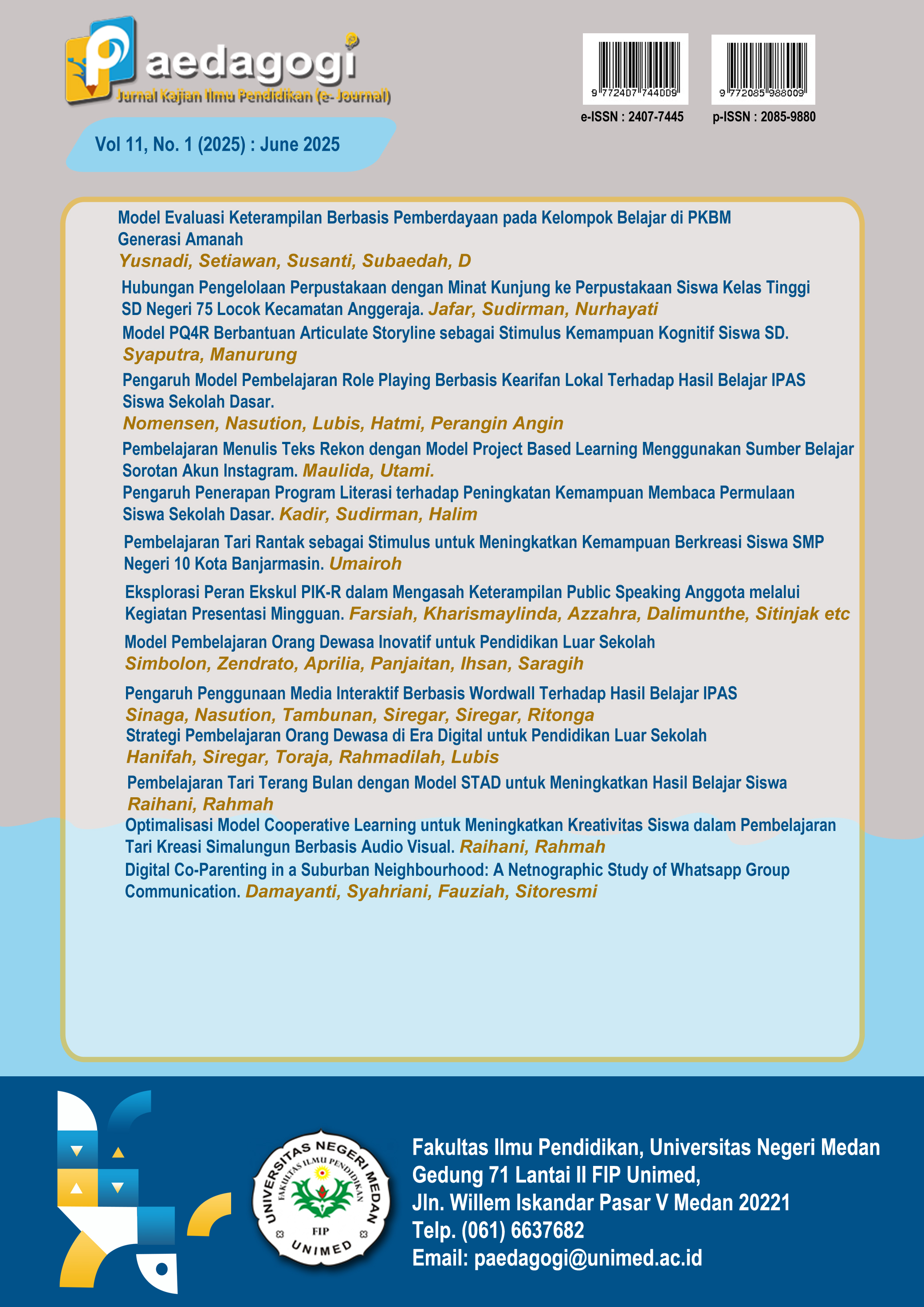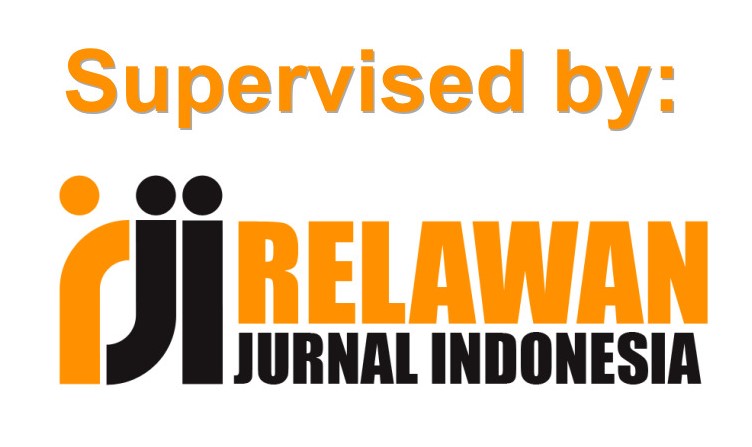Digital Co-Parenting in a Suburban Neighbourhood: A Netnographic Study of Whatsapp Group Communication
DOI:
https://doi.org/10.24114/paedagogi.v11i1.67338Keywords:
Digital co-parenting Communication, Netnographic, Suburban community Child supervisionAbstract
Amid the growing integration of digital communication in everyday life, parenting is no longer confined to the private domain of the nuclear family. In many residential settings, particularly in suburban neighborhoods, caregiving has become a collective effort facilitated by digital platforms such as WhatsApp. However, this form of distributed digital parenting remains underexplored, especially within communal cultures like those found in Indonesia. This study aims to explore digital co-parenting practices in a WhatsApp group of residents living in a suburban housing complex in North Sumatra, focusing on the shared supervision of children aged 4–6 who frequently play in communal neighborhood spaces. Conducted from February to March 2025, the research adopted a netnographic approach, collecting data from WhatsApp group conversations, direct observations, and interviews with parents. Thematic analysis was applied and interpreted through the lenses of communities of practice, social capital, and affordance theory. The findings reveal that WhatsApp serves as a key medium for trust-based caregiving, emotional support, and collaborative child supervision. This study contributes to emerging understandings of digital gotong royong in parenting. The article also discusses the study’s implications, limitations, and recommendations for future research.References
Asname, F., & Berrada, A. (2024). Netnography (pp. 1–22).
Banić, L., & Orehovački, T. (2024). A Comparison of Parenting Strategies in a Digital Environment: A Systematic Literature Review. Multimodal Technologies and Interaction, 8(4), 32.
Bei, E., Morrison, V., Zarzycki, M., & Vilchinsky, N. (2023). Barriers, facilitators, and motives to provide distance care, and the consequences for distance caregivers: A mixed-methods systematic review. Social Science & Medicine, 321, 115782.
Bowlby, S. (2011). Friendship, co-presence and care: neglected spaces. Social & Cultural Geography, 12(6), 605–622.
Burrow, J. (2017). Life’s work in the city without ground : cross-border family politics between Shenzhen and Hong-Kong. University of Oulu.
Chalklen, C., & Anderson, H. (2017). Mothering on Facebook: Exploring the Privacy/Openness Paradox. Social Media + Society, 3(2).
Cino, D., Gigli, A., & Demozzi, S. (2021). ‘That’s the only place where you can get this information today!’: An exploratory study on Parenting WhatsApp Groups with a sample of Italian parents. Studi Sulla Formazione/Open Journal of Education, 24(1), 75–96.
Coleman, M., Ganong, L. H., Clark, J. M., & Madsen, R. (1989). Parenting Perceptions in Rural and Urban Families: Is There a Difference? Journal of Marriage and the Family, 51(2), 329.
Creswell, J. W. (2013). Qualitative Inquiry and Research Design: Choosing Among Five Approaches. SAGE Publication, Inc.
Di Tullio, M., & Gómez-Cruz, E. (2025). Mobile mutuality of being: WhatsApp and kinship at the top of the world. Mobile Media & Communication.
Hendriati, A., & Okvitawanli, A. (2019). Challenges of Parenting in an Urban Setting. Psychological Research on Urban Society, 2(1), 36.
Hutchby, I. (2001). Technologies, Texts and Affordances. Sociology, 35(2), 441–456.
Lave, J., & Wenger, E. (1991). Situated Learning. Cambridge University Press.
Livingstone, S., & Blum-Ross, A. (2020). Parenting for a Digital Future: How Hopes and Fears about Technology Shape Children’s Lives. Oxford University Press.
Livingstone, S., & Byrne, J. (2018). Parenting in the Digital Age: The Challenges of Parental Responsibility in Comparative Perspective. In G. Mascheroni, C. Ponte, & A. Jorge (Eds.), Digital Parenting: The Challenges for Families in the Digital Age (pp. 19–30). Nordicom.
Lupton, D., Pedersen, S., & Thomas, G. M. (2016). Parenting and Digital Media: From the Early Web to Contemporary Digital Society. Sociology Compass, 10(8), 730–743.
Marshall, N. L., Noonan, A. E., Mccartney, K., Marx, F., & Keefe, N. (2001). It Takes an Urban Village. Journal of Family Issues, 22(2), 163–182.
Mascheroni, G. (2020). Datafied childhoods: Contextualising datafication in everyday life. Current Sociology, 68(6), 798–813.
Mascheroni, G., Cino, D., Amadori, G., & Zaffaroni, L. G. (2023). (Non-)Sharing as a Form of Maternal Care? The Ambiguous Meanings of Sharenting for Mothers of 0- To-8-Year-Old Children. Italian Sociological Review, 13(1), 111–130.
Miles, M. B., & Huberman, A. M. (1994). Qualitative data analysis (2nd ed.). SAGE Publications, Inc.
Morris, M. E. (2020). Enhancing relationships through technology: directions in parenting, caregiving, romantic partnerships, and clinical practice . Dialogues in Clinical Neuroscience, 22(2), 151–160.
Pang, N., & Woo, Y. T. (2020). What about WhatsApp? A systematic review of WhatsApp and its role in civic and political engagement. First Monday.
Pemberdayaan, J., Dan, S., Masyarakat, T., Tasril, V., Rizka, A., Sulistianingsih, I., & Sari, N. (2025). Digital Parenting: Pelatihan Strategi Pengawasan Anak Di Era Gadget Bagi Ibu Rumah Tangga Di Desa Kelambir V. Jurnal Pemberdayaan Sosial dan Teknologi Masyarakat, 5(1), 74–81.
Putnam, R. (2000). Bowling Alone: The Collapse and Revival of American Community. Simon & Schuster Paperbacks.
Skeen, S., Marlow, M., du Toit, S., Melendez-Torres, G., Mudekunye, L., Mapalala, E., Ngoma, K., Ntanda, B. M., Maketha, M., Grieve, C., Hartmann, L., Gordon, S., & Tomlinson, M. (2023). Using WhatsApp support groups to promote responsive caregiving, caregiver mental health and child development in the COVID-19 era: A randomised controlled trial of a fully digital parenting intervention. DIGITAL HEALTH, 9.
Steinert, S., & Dennis, M. J. (2022). Emotions and Digital Well-Being: on Social Media’s Emotional Affordances. Philosophy & Technology, 35(2), 36.
Suryanada, A. K., & Aprilia, M. P. (2024). The Communication Patterns In Whatsapp Groups To Enhance Communication Effectiveness (A Case Study In “Guyub Rukun” Family Whatsapp Group). International Conference on Communication and Media Digital, 1(1), 181–194.
Taipale, S., & Farinosi, M. (2018). The Big Meaning of Small Messages: The Use of WhatsApp in Intergenerational Family Communication (pp. 532–546).
Tawodzera, O. (2025). ‘Mum Added You’ Managing Transnational Aged Care Arrangements Through Family WhatsApp Groups. Global Networks, 25(1).
Tixier, M., & Lewkowicz, M. (2016). “Counting on the Group.” Proceedings of the 2016 CHI Conference on Human Factors in Computing Systems, 3545–3558.
Traeger-Soudry, S., Rosenberg, H., Sabag-Ben Porat, C., & Lowenstein-Barkai, H. (2025). Navigating parental engagement in WhatsApp groups: A study of parent-teacher experiences. Teaching and Teacher Education, 162, 105074.
Widiatmika, K. P. (2019). The Lost Family: The Stories of Indonesian Family Conflicts and Political Messages in Whatsapp Groups. University of Twente.
Downloads
Published
Issue
Section
License
Copyright (c) 2025 Nina Afria Damayanti, Ririn Syahriani , Nurul Isra Fauziah , Woro Endah Sitoresmi

This work is licensed under a Creative Commons Attribution-ShareAlike 4.0 International License.
Authors published with the Paedagogi: Jurnal Kajian Ilmu Pendidikan (e-journal) agree to the following terms:
- Authors retain copyright and grant the journal the right of first publication with the work simultaneously licensed under a Creative Commons Attribution License (CC BY-SA 4.0) that allows others to share the work with an acknowledgment of the work's authorship and initial publication in this journal.
- Authors are able to enter into separate, additional contractual arrangements for the non-exclusive distribution of the journal's published version of the work (e.g., post it to an institutional repository or publish it in a book), with an acknowledgment of its initial publication in this journal.
- Authors are permitted and encouraged to post their work online (e.g., in institutional repositories or on their website) prior to and during the submission process, as it can lead to productive exchanges, as well as earlier and greater citation of published work. (See The Effect of Open Access)












